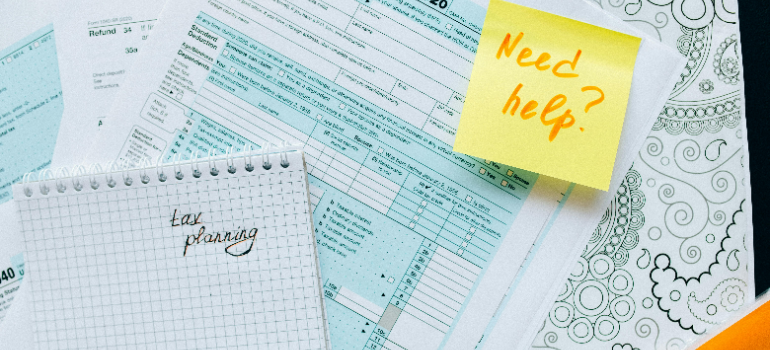Managing Finances and Currency Exchange During International Moves
Get a QuoteRelocating to a new country presents unique financial challenges, from managing finances and currency exchange during international moves to setting up a new home. Effective financial management can make the difference between a nice transition and potential setbacks. Whether you’re budgeting for the move or figuring out currency conversion, planning ahead can save you time and headaches. Partnering with a reliable company that offers relocation services in Virginia can also streamline the process, ensuring you have the support you need to go through these financial waters.
Pre-Move Financial Planning
Setting a budget and financial goals before an international move is like drawing a map for your adventure abroad. Begin with a clear assessment of your current finances. Review your savings, checking accounts, and investment portfolios to understand your financial footing. This overview allows you to allocate funds appropriately, covering moving expenses and initial costs in your new home. Next, outline your expected expenses related to the move. Include travel costs, shipping fees, and any services you’ll need from international moving companies in Virginia. Anticipate initial expenses like housing deposits and basic living costs until you establish a regular income stream in the new country.
Transitioning this plan into a budget helps prevent financial surprises. As you list these expected costs, prioritize them and identify areas where you might cut back. For instance, if certain items are less costly to replace than to transport, consider leaving them behind. Also, set financial milestones for short and long-term goals. Perhaps you aim to rebuild your savings within six months or invest in property after a year. Regularly tracking these goals can guide your spending and saving habits, keeping your finances robust in this new chapter of life.

Currency Exchange Strategies
Getting the best currency exchange rates often involves timing and choice of service. Monitor exchange rates in the weeks or months before your move, as these can fluctuate significantly. Engaging in this practice allows you to exchange your money when rates are most favorable, potentially saving you a considerable amount. When considering where to exchange your currency, weigh the options between banks, currency exchange services, and online platforms. Banks are typically considered secure and reliable, but they may offer lower competitive rates and higher fees. Currency exchange services can provide more competitive rates and are convenient for last-minute exchanges at airports or malls, though their reliability can vary.
Online platforms often offer the best rates and low fees. They are accessible and convenient, allowing you to exchange large sums of money from the comfort of your home. However, using reputable platforms is necessary to avoid potential security risks. Each option plays a role in managing finances and currency exchange during international moves. Your choice might depend on the amount of money you’re exchanging, how quickly you need the funds, and your comfort level with each service.
Banking and Financial Services
Choosing the right bank in your new country starts with researching local financial institutions. Look for banks that offer low fees, good customer service, and online banking capabilities. Check if they have experience handling accounts for expatriates, as they can guide you through local financial nuances. Setting up international banking before your move eases the financial transition. Many global banks have branches worldwide or partnerships with local banks. Open an account with one of these banks, and you can start managing your finances smoothly as soon as you land.
Also, consider digital banking solutions that offer international services. These platforms make it easier to transfer money between countries and typically provide tools to manage different currencies effectively. Before finalizing a bank, compare the services, fees, and accessibility of several banks. Secure an appointment to set up your account either online or in person immediately upon arrival.

Managing Expenses in the New Country
Adjusting to the cost of living abroad can be challenging, but with the right strategies and tools, you can manage your expenses effectively. Start by tracking all your expenditures to understand where your money goes. This insight helps you identify areas where you can cut back or need to allocate more funds. Consider using various budget management tools and apps that simplify this process:
- Mint: Helps you create budgets and automatically tracks your spending against them.
- You Need a Budget (YNAB): Focuses on giving every dollar a job, ensuring you know exactly how your money is being used.
- Expensify: Ideal for tracking expenses and receipts, which is particularly useful for managing moving and settling-in costs.
Additionally, understanding local shopping habits and prices can prevent overspending. Shop where locals do and use community resources to find the best deals. While managing finances, don’t forget other aspects of settling in, like learning a new language. Being able to communicate can dramatically affect your understanding of costs and financial norms in your new home.
Tax Considerations
When moving abroad, understanding your tax obligations in both your home country and the new country is something you can’t skip. Each country has its own tax laws, which might require you to pay taxes on worldwide income or only on income earned within its borders. This complexity increases if your home country continues to tax expatriates on their global income. It’s wise to consult with a tax professional specializing in expatriate tax issues to handle dual taxation. They can provide guidance on tax treaties between countries that may apply to your situation, potentially reducing your tax burden. A professional can also help you plan for and comply with tax filing requirements.
Setting up early consultations with tax advisors should be part of managing finances and currency exchange during international moves. They can offer strategies that align with your overall financial planning. Their expertise becomes invaluable, especially if you have assets like property or investments in more than one country.

Financial Security
Securing financial transactions and safeguarding against fraud are pivotal when getting ready for an international move. Always use secure, reputable platforms for your financial activities, and enable strong authentication measures on all banking and payment accounts. Additionally, monitor your accounts regularly for unauthorized transactions, especially during the hectic periods of moving. Insurance plays a big role in protecting your belongings and financial well-being during the transition. Opt for comprehensive coverage that includes international transit and initial living arrangements in the new country.
An emergency fund is equally vital. This fund is a financial buffer to help you manage unforeseen expenses and disruptions without derailing your financial stability. Aim to have at least three to six months’ worth of living expenses saved up. This reserve ensures that you won’t be forced into compromising situations if you face unexpected costs or delays in establishing a regular income stream in your new country.
Managing Finances and Currency Exchange During International Moves with Ease
Effective financial management and currency exchange are fundamental for international relocation. It empowers you to face the financial aspects of moving with confidence. Proactively planning and regularly monitoring your financial health in your new country are useful steps. These actions ensure that you remain on solid financial footing, allowing you to enjoy the exciting opportunities your new environment has to offer.
